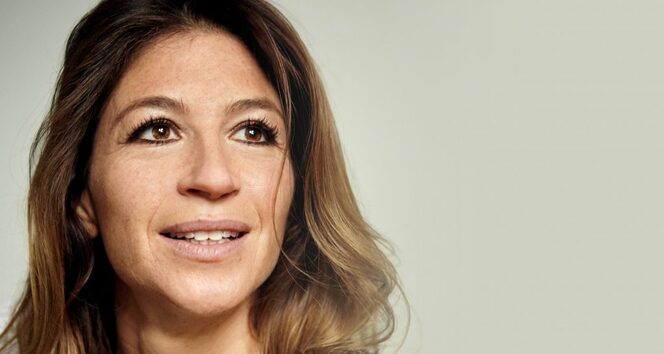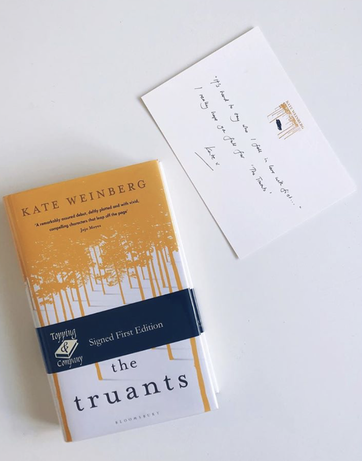The Truants is Weinberg’s remarkable debut novel, deftly plotted and with vivid, compelling characters that leap off the page. It is a character driven thriller and modern day coming-of-age story about a clever group of misfits who yearn to break the rules. I read the book early this year and it immediately stood out to me. I found it unsettling, challenging, strangely funny and beautifully written. I loved it and was thrilled to be able to speak with the author about her work this week.
I’m now delighted to share with you my online interview with Kate Weinberg, author of The Truants.
What is your writing process like and where do your ideas come from?
Weinberg: In terms of process, I’ve got a few things stacked against me as a novelist. I’m not a morning person, I find it hard to resist the call for coffee with a girlfriend, I’m scared of the first draft, and I’m more of a sprinter than a marathon runner – so I work better in intense bursts than consistently over long periods.
Having said that I have finally worked out that the best way for me to create a scene from scratch is to write it first in longhand, and then transcribe it onto the computer, which acts as a kind of second draft. So, although I don’t have a routine, I do have a process which involves a pen and paper (so retro, I know.) Almost all my ideas start from experiences or people in my life, but they are coded and pushed to the extreme so it would take a good detective to work them out!
I loved the references to Agatha Christie in The Truants, and it is clear you’re a fan of her work. Me too! I loved how the students discussed not only her writing, but her personal life also. What kind of research did you do on Christie, and how long did you spend researching before you began writing?
Weinberg: In one sense I have always been researching for The Truants, as I’ve been reading Agatha Christie since I was around 10. At the age of 11 I chose Christie as a special subject in an English Oral exam, and that’s when I first discovered about her missing 11 days which is the basis of a big theme in my book.
In general, though, I’m in too much of a rush to get to the writing stage. Research for me is all about building confidence to write a scene realistically, and then not making sure I don't wear the research itself heavily. So, I have to discipline myself to research more than I naturally would. I think of it a bit like putting up scaffolding. You need to make sure it's secure first, then take it down afterwards otherwise the writing feels too clunky!
Do you have a favourite Agatha Christie novel? Team Poirot or Miss Marple?
Weinberg: Oh, that’s a hard one. I flirt with both sides! Some favourites: Sleeping Murder, because I love the eeriness of the echoes of a cold case, The Mysterious Affair at Styles because of the cat’s cradle of the plot, Evil Under the Sun because of the way it messes with triangles, The Murder of Roger Ackroyd because it pushed boundaries of the detective novel, and And Then There Were None because it’s simply impossible to crack on first reading. In the end, though, the book of Christie’s that has most touched me is “Absent in the Spring”, written under her pseudonym, Mary Westmacott. I write about it in “The Truants” as I think it comes closest to unlocking the emotional mystery of Agatha Christie herself.
Lorna Clay is such a captivating character. If the book was adapted into a film or Tv series, who would you pick to play her onscreen?
Weinberg: Oh, thank you: Lorna was the beating heart of the book for me so I’m glad you say this. So, this is an easy one, as when I wrote the descriptions of Lorna, I had a particular person in mind – an actress who is a very dear friend of mine, Julianne Nicholson. Julianne would be a knockout Lorna. She’s one of those brilliantly understated actresses who would be perfect at conveying all the moral ambiguity I tried to create in Lorna.
Which other novelists have inspired you over the years? When did your passion for writing really begin?
Weinberg: I can’t remember when my passion for reading books blended into an intention to write, because it always felt like more or less the same thing. Creative writing was always my favourite subject at school from about bout 9 or 10. I read a huge amount as a teen and devoured all the classics under my duvet, with a torch, after lights-out: Austen and Hardy, the Bronte’s and George Eliot. In my late teens I became a huge first-person novel fan. Some of the books that became my bibles were: The Magus by John Fowles, The Great Gatsby by Scott Fitzgerald, Catcher in the Rye by J.D. Salinger, and Rebecca by Daphne Du Maurier.
What’s your opinion on writer’s block and how do you deal with it?
Weinberg: I only get blocked when I don’t know enough about my characters or what I want to do in a scene and then it comes out dead or wooden. So, I either have to do a bit more thinking – often I talk it out with another writing friend - either about the character’s backstory or a different way of approaching the scene. If it still feels like the tap is switched off, I go back to one of the key books that have inspired me and reread a random section for the zillionth time to remember the magic that I’m looking for.
I heard you were once a bookshop assistant. It must be a really proud moment to see your own novel out on the shelves. As a frequent visitor and lover of bookshops myself, was there a particular bookstore you were most excited to be featured in?
Weinberg: Oh yes, many! It was, and is, thrilling beyond words. I had my UK book launch in Daunt on Marylebone High Street, which is a stunning bookshop, with a room at the back that has a gallery like an old library. I also love the beautiful Topping and Company Bookshop in Bath where they carefully wrap every hardback in cellophane so that it looks like a piece of art, Southwold Bookshop – on the most perfect high street in Suffolk - and my local bookstore, Queens Park Books. The biggest surprise has been a bookshop in Auckland, New Zealand where a bookstore called “Unity Books” has really got behind it. I can’t wait to go in and meet the lovely bookseller in there one day.
What advice might you give to any new writers who are just getting started?
Weinberg: Get some support, either a writing friend, a group, or a course. I find the solidarity and wisdom from other writers invaluable to the process.
Lockdown is a great time to curl up with a book. What are you reading lately?
Weinberg: I’ve just started reading Maggie O’Farrell’s new novel, Hamnet. I’m a great O’Farrell fan, and it was only when I had read a couple that I realised she shares my fascination with vanishing characters.
I’m dying to read Hamnet also. What can we expect from your second novel? I’m really looking forward to reading it!
Weinberg: Thank you for saying that! Well, I’ve only just started writing it, but it’s also the book I’ve always wanted to write, so I’m very excited. Some of it is set in Johannesburg, South Africa, and some in London. The main character is a 34-year-old woman called Ellie who is trying to find out about her mother who died suddenly when she was 5. It’s more about emotional crimes than real corpses – but the kind that Miss Marple would like: a cold case! I hope I can write it as well as the story that's in my head.
The Truants is a hugely atmospheric and addictive read from start to finish. I loved the mood of it. The characters. The ending. The whole thing. Weinberg’s debut novel is wonderfully satisfying, and such an enticing read.
Kate Weinberg was born and lives in London. She studied English at Oxford University and creative writing at the University of East Anglia. She has worked as a slush pile reader, a bookshop assistant, a journalist and a ghost writer. The Truants is her first novel. I’m excited to read more from her soon!
Thanks again to Kate Weinberg for kindly taking the time to answer my questions here. She is currently juggling small children and a pandemic so I'm delighted that we were still able to talk!
I’m hoping to post other interviews like this soon, so stay tuned for more.
Kate Weinberg was born and lives in London. She studied English at Oxford University and creative writing at the University of East Anglia. She has worked as a slush pile reader, a bookshop assistant, a journalist and a ghost writer. The Truants is her first novel. I’m excited to read more from her soon!
Thanks again to Kate Weinberg for kindly taking the time to answer my questions here. She is currently juggling small children and a pandemic so I'm delighted that we were still able to talk!
I’m hoping to post other interviews like this soon, so stay tuned for more.


